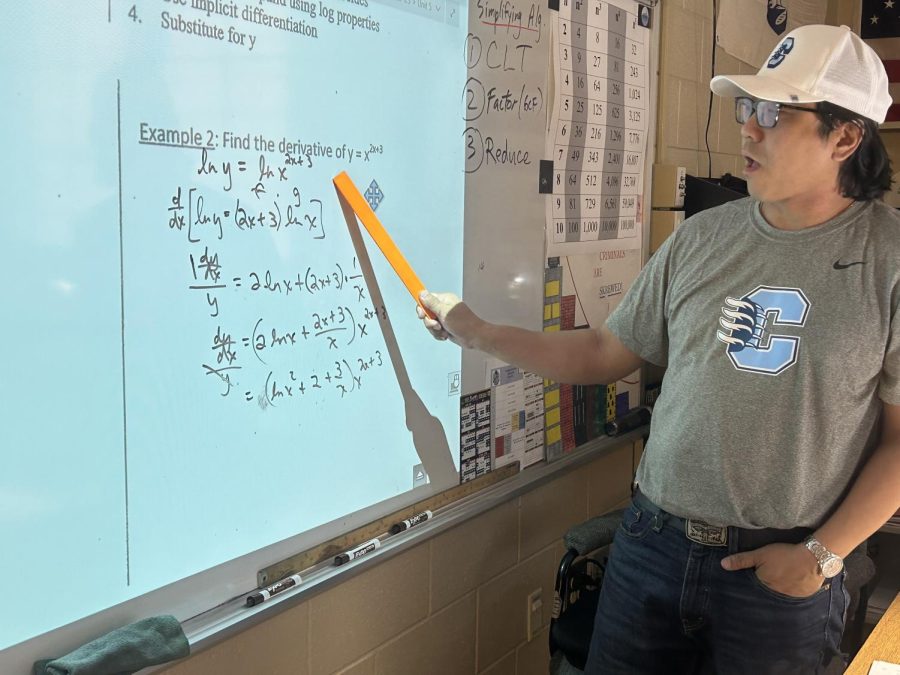Previewing Georgia’s K-12 Mathematics Standards: Fulton County’s New Math Curriculum for 2023
Gene Kim teaching his students how to derive a function.
March 8, 2023
The Georgia Standards of Excellence (GSE), as they apply to mathematics, are no more.
In their place, and to be fully implemented in the fall of 2023, are Georgia’s K-12 Mathematics Standards, a state-grown curriculum from the minds of Georgia teachers, parents and business leaders.
These standards seek not to change what math is being learned, but to change how it is learned.
Math Department Chair Brian Wynne said he doesn’t remember a curriculum with quite as much transparency or one that featured as much community involvement.
“I’ve never had a math curriculum before that really emphasized preparing students for the future as much as I believe this one does,” he said.
Among the biggest changes are the redistribution of standards among math courses, the elimination of the accelerated pathway, the separating of honors and on-level math students and the potential opportunity for all students to take an AP math class in high school.
Redistribution of Standards
Under the GSE, the core math courses of algebra, geometry, advanced algebra and precalculus each had 45 standards. However, under the K-12 standards, there are only 7 to 11 standards per course.
This is not because standards are being eliminated, but rather combined to be more overarching. All specific standards are also paired with a “Big Idea,” a general summary of math concepts that should be mastered in a specific grade level.
“It’s really just a simplification. We’re trying not to get bogged down in teaching math because besides math, we need to focus on critical reasoning, analysis, argumentation and a ton of other things that the old curriculum didn’t really allow for,” Wynne said.
Accelerated Program
The accelerated program has also been chopped off along with the GSE. Those classes, which covered three semesters of content in two semesters, will no longer be offered.
Accelerated classes were first adopted because of students who felt they weren’t being challenged by existing math classes, according to Gene Kim, who teaches algebra and calculus.
“It was a combination of the rigor you’d get from an average honors course combined with a faster pace,” he said.
However, with less time to cover critical concepts, teachers like Kim saw a decline in test scores and student participation.
“A few kids wouldn’t ask questions, wouldn’t attempt work,” he said. “Eventually, we realized that it was doing more harm than good.”
Ninth grade students that began the accelerated pathway can choose to complete it, if they desire, by taking an online GSE Geometry B course through FVS.
Separation of Honors and On-level Students
Third, honors and on-level math students will no longer be combined in the same classes, as they were this year.
“We had students that were mismatched. Some were better at certain things because of what they learned in the past. At least for me, it was a bit more difficult to teach because it felt like teaching two classes at times,” said Sarah Akin, who teaches on-level algebra.
AP Precalculus Introduction
Fourth and finally AP Precalculus may become available to juniors, marking the first time that all students, regardless of math pathway, will have the chance to take an AP math class in high school.
Andrea Little, who teaches honors precalculus, said she hopes it’s approved.
“The earlier we get students learning and thinking about college-level math, the better prepared they’ll be when they leave here,” said Little.
She said the world demands creative thinkers, not people who can just repeat memorized material.
“If we don’t succeed in readying our students to achieve what they’re capable of, why should any of us teach?” said Little.
The End Goal
Wynne said his hopes for the new curriculum have to do with how students are prepared to tackle the real world.
He said the goal is to have more eighth graders take Algebra I and more high school students take an AP math class as a junior or senior.
“It might take a few years to smooth out the kinks, but I have every hope we’re going to get there.”


audacious new yorker • Mar 12, 2023 at 3:53 pm
we have AP stats at my school 😮 taking an AP math would make me hate math even more than i alr do though so #nothanks